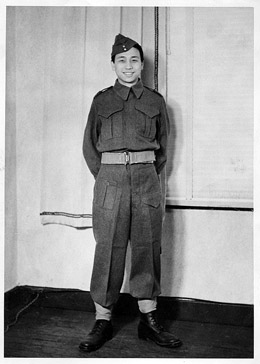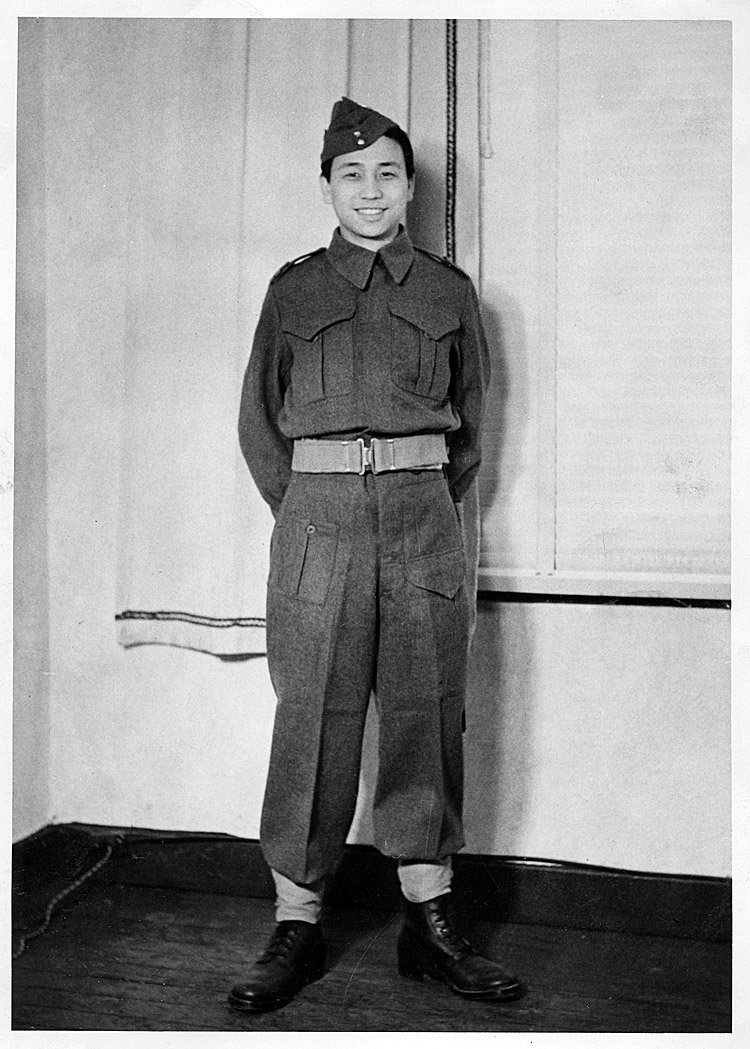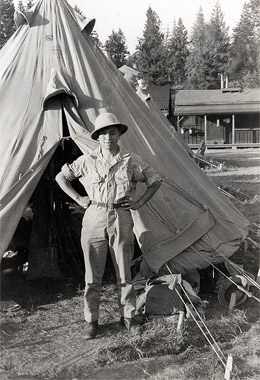Roy Mah
Roy Mah is considered a pillar of the Chinese-Canadian community. He fought for the Chinese-Canadian right to vote prior to his war efforts. He also fought for Canada's multiculturalism policy through his pioneering magazine, Chinatown News. « View Transcript
Ramona Mar (Interviewer)
The unassuming, humble man who walks the streets of Vancouver's Chinatown is known by almost everybody here. That's because for 42 years, as editor of Canada's first English-language news magazine for Chinese-Canadians, Roy Mah has earned the community's respect for his tireless devotion to a multicultural and just Canada. Many however, don't realize that Roy's passion for equality began when he was just a young man.
As World War Two erupted, so did the controversy over whether Chinese-Canadians should volunteer to fight for a Canada that didn't even give them the right to vote. One faction argued that Chinese-Canadians should get the right to vote first, BEFORE volunteering to fight. Roy felt otherwise.
Roy Mah (Interviewee)
The other faction, led by myself, I said no because for this reason: The Chinese community was too small at that time. All of Vancouver there were only about 7000 Chinese and of military age, maybe only a couple of a hundred. All, the total Chinese population in Canada was maybe around 30,000 and of military age, less than 1,000. You're not going to exert enough pressure with such a miniscule number you're not going to put enough pressure on the government to give in to your demand. I said far better, now is our golden opportunity, far better to enlist now, go and serve prove to the Canadian public, prove to the Canadian government that we are loyal Canadians, that we were born in this country, that we deserve equal rights, we deserve equal status. And then, when we come back from the war we would have full credentials to demand for our rights.
Ramona
By the time the focus of the war turned to Japanese aggression in Asia, Roy had been promoted to Sergeant and chosen to lead an all-Chinese-Canadian contingent of 109 men to fight the Japanese behind enemy lines in the Malaysian-Singapore front. Force 136 was under the British Command of Lord Louis Mountbatten.
Roy
In Malaysia and Singapore, one third of the population was Chinese so they needed Chinese to be flown in behind enemy lines and organize guerilla movements. You know, coordinate the activities with the local population to harass the Japanese. And that's why at that time they wanted the service of Chinese-Canadians.
Those of us who volunteered, you know went overseas and you know, we even had danger pay, had extra 200 dollars, for the nature of the work that we had to do. In fact, some of the items that they issued us on our mission, among all the items, was two cyanide tablets. They say if you get captured and the Japanese would interrogate you to get information from you about the Allied Forces. If they torture you to try to get the information, you can't stand it; you swallow it.
Ramona
Roy trained as a dynamiter and along with other members of Force 136 waited for the word to make the ultimate parachute jump into enemy territory.
Roy
To be honest with you, when I got my order to leave in about another four days I was a little bit scared; very apprehensive. You're going into enemy-occupied territory, nothing but Japanese there, you could easily be caught so, but that sense of duty, you know you just shrug it off.
Ramona
Despite his preparation and training, Roy's group was spared by the timing of the atomic bomb and the mission was put on hold. A very happy and relieved young man came home to Canada having done his duty in the hopes of getting his people the vote.
Roy
We were very happy that we were able to do something for the Chinese Community. Even while we were away overseas, the Chinese community was already lobbying the government. They keep on pointing, "Look at our boys! Look at, they are willing to sacrifice their lives for our country and yet you still don't recognize us as Canadians. How much more loyalty do you need to prove our sincerity?" And they present briefs to the government, they lobbied the different politicians and so on. So when we came back, we feel a sense of pride that we had been able to accomplish something, because had it not been for us, we certainly would not have got it so fast.
Ramona
Launched by his experience in the Second World War, Roy would spend the rest of his career as a journalist to forge the multicultural Canada of today. His Chinatown News Magazine took on issues with a proud Chinese-Canadian perspective.
Roy
I know that we can't have everything we want in life, but we can always strive to achieve our objective. So I always want to fight for a cause, especially for a just cause. Fight for civil liberty, fight for equal rights, fight for a fairer society. It has become reality now, you know, it's just a matter of daily life. You know, these people enjoying all these privileges and rights you know, that we had to fight so hard to achieve.
Did you Know?
Did you know that Roy Mah led an emotional debate arguing that Chinese-Canadians should go to war before they received the right to vote?
Table of Contents
- John Ko Bong member of Operation Oblivion
- Mary Ko Bong an instrument mechanic
- Neill Chan deciphered communications
- Paul Chan served in the Second World War
- Roy Chan served in the Second World War
- Bill Chong served as Agent 50...
- George Chow trained as a gunner
- Marshall Chow a wireless operator
- Douglas Jung represented CA at UN
- Daniel Lee an aircraft mechanic
- Peggy Lee served in the home front
- Alex Louie trained in India to parachute
- Albert Mah flew 420 return trips from...
- Cedric Mah a pioneering bush pilot
- Roy Mah a pillar of the community
- Gordie Quan full military career
- Andrew Wong in US Merchant Marines
- Frank Wong in Holland for the liberation
- Henry Albert (Hank) Wong
- Larry Wong in Newfoundland Regiment
- Mary Laura Wong (Mah) a teletype operator
- Date modified:


